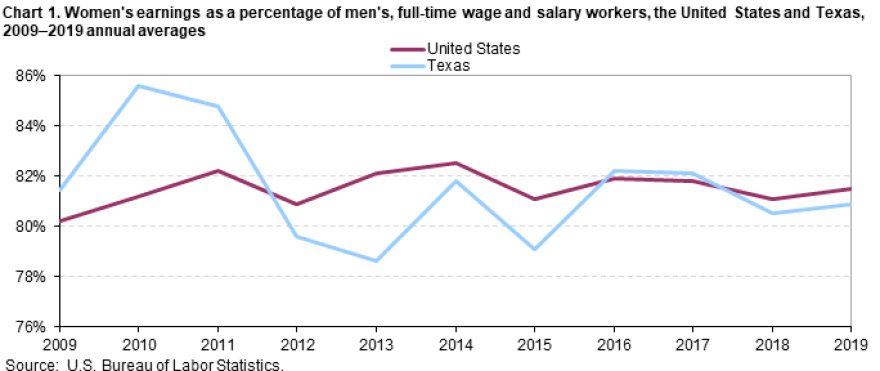The Equal Pay Act mandates equal pay for equal work. Nearly six decades later, women are making just over 80% of what their male counterparts make — and it’s been that way since 2004.
When data was first collected in 1979, women’s earnings were 62% of men’s. Spurts of growth in the 1980s (64% to 70%) and the 1990s (72% to 77%) brought women to the 80-83% range in the early aughts. It hasn’t changed much since.
Nationally, women earned 81.5% of the $1,007 median weekly salary for men in 2019 — about $821. That number is lower for Texas women: full-time wage and salary workers. Those Texas women earned a median weekly salary of $772, about 80.9% of the weekly earnings of their male counterparts.
The ratio of women’s to men’s earnings in Texas has varied in the last decade, peaking at just under 86% in 2010. In only eight states, and the District of Columbia, was that ratio 85% or higher in 2019.

The gap for women of color is greater. Black women made 67.9% of what white men earned in the U.S. in 2019. Latina women made 61.9% compared to white men in 2019.
Some experts say the pandemic may make the gender pay gap worse. The current recession, brought on by the COVID-19 pandemic, has hit women harder.

While overall unemployment rates have skyrocketed, the rate for women has been higher than that of men, according to a new study. In-person service jobs have been affected most negatively by the crisis, and those positions are disproportionately held by women.
“The lockdown measures implemented in a pandemic recession have a large effect on high-contact sectors such as hotels and restaurants, which have large shares of female employment. Thus, unlike in a regular recession, more women than men are directly affected by layoffs,” the study finds.
One in three Black women is on the frontlines during the pandemic, and the unemployment rate in 2020 is higher for Latina women than any other demographic.
The pandemic has also affected the amount of work expended at home. With many schools and day care facilities closed, parents are spending more time on child care — especially women, who spend 6 hours more per week than a male guardian for a child younger than 5.
Pre-pandemic, female guardians were spending 3 hours more on child care compared to male guardians, per the study.
“Women shoulder the majority of this additional responsibility, further decreasing their ability to work,” the study finds.
In past recessions, the gender pay gap has actually shrunk by about 2% because of what the study’s economists call the “second-earner effect.” Women set out to gain experience and better jobs which ultimately closes the gap.
The study projects that in 2020, the gender pay gap will have widened by about 5%, since many women have been unable to get new jobs or take on extra hours.
“In the short and medium term, a pandemic recession erodes women’s position in the labor market, first through direct employment losses, and later through the loss in labor market experience brought about by low employment during the recession,” the study said.
Ultimately, the economists say this will lead to a widening of the gender wage gap during the pandemic and in its aftermath.
TPR was founded by and is supported by our community. If you value our commitment to the highest standards of responsible journalism and are able to do so, please consider making your gift of support today.


